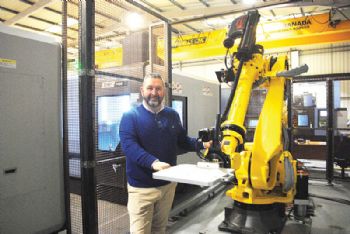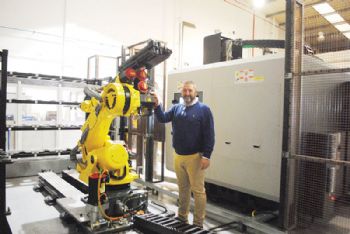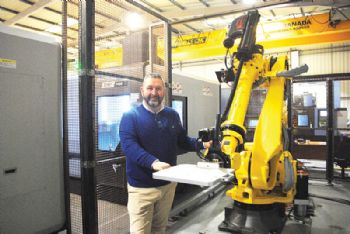
A custom-designed and built automated two-machine manufacturing cell is currently being installed and commissioned at Lenane Precision’s facility in Smithstown (Shannon).
The cell represents a significant investment for Lenane; when operational, it will run 24/7, delivering significant productivity gains and process efficiency improvements to increase the Irish company’s competitiveness.
Completed last month at the Leamington Spa facilities of Mills CNC Ltd
(
www.millscnc.co.uk), the turn-key project — started in early 2019 — comprises two Siemens 840D-controlled Doosan DVF 5000 five-axis machining centres, together with a Fanuc industrial robot on a track that runs between the two adjacent machines, enabling the robot to undertake part loading and unloading operations at both.
Integrated racking systems hold up to 36 standard pallets (400 x 400mm with a maximum load of 140kg), onto which workpieces are clamped and then loaded into the DVF 5000 machines; pallets with machined components are similarly unloaded from the machines and stored.
A 2m-high safety cage encloses the robot track and restricts access to the DVF 5000 machines’ loading and unloading operations.
At the heart of the system is an advanced touch-screen HMI that uses Mills CNC’s proprietary SynerGi software to control the cell and provide a ‘seamless interface’ with its machine tools, robot and peripheral equipment.
Established in 1994, Lenane Precision is committed to continuous improvement and regularly invests in the latest machine tool technologies.
Since 2012, the company has almost exclusively used Doosan machines; it has bought four new Doosan machining centres (including two five-axis machines) and three new Doosan multi-tasking lathes — all from Mills CNC.
Having started out as Lenane Tool & Die — supplying progression tools, punches, dies and mould inserts — the company was rebranded in 2009 as Lenane Precision, due to a shift in emphasis from tool and die work to precision machining; it is now one of Ireland’s premier sub-contractors.
‘Aerospace driver’
Lenane serves a number of sectors, including aerospace, medical devices, and oil and gas.
However, the driving force behind the automated machining cell was the company’s growing aerospace business (particularly the machining of high-precision aero-structure parts), along with its aim to strengthen its position in the aerospace supply chain.
Managing director Jim Lenane said: “The aerospace sector is global, challenging and demanding; and while success is never guaranteed, if you cannot meet the industry’s exacting quality requirements, stringent lead times and cost-down demands, you are on a hiding to nothing.”
Some of Lenane’s recent business decisions and activities demonstrate the company’s commitment to growing its aerospace business.
For example: the company has achieved AS 9100 certification and is an SC21 member; it is also a member of the Emerald Aero Group (an Irish manufacturing consortium established to support the aerospace sector’s supply chain); and it has invested in Doosan five-axis machining technologies.

Moreover, Lenane’s recent purchases of multi-axis multi-tasking machines also confirm its commitment to one-hit machining.
For some companies, the performance improvements gained from such investments might have been enough, but not for Mr Lenane, who said: “Continuous improvement is a journey, not a destination.
“My ambition has always been to exploit the full potential of automation, the objective being to achieve continuous and seamless production in our facility, and to reduce — as far as is possible — the labour component of our machining processes.
“I was waiting for the right time to realise the vision we had for automation.
“With orders from our existing aerospace customers reaching an all-time high at the tail end of 2018, and with firm commitments from them to place more orders with us in the future, the decision to make our vision a reality was taken.”
Developing a specification
From the outset, a number of potential automation routes were rejected, including machining centres with integrated automatic pallet changers.
Mr Lenane said: “Integrated workpiece pallet changers were clearly an option or us, but this route had its limitations from a continuous-production perspective because of the number of pallets available.
“I wanted something more ambitious — an automation solution that was future-proof — and I knew that one using industrial robots was the likely route.
“We set about exploring the options and alternatives; and to help us select the optimum solution, a number of prerequisites were drawn up.”
Lenane’s first requirement was that the cell needed to be inherently flexible.
“Although we had earmarked the cell for machining high-precision aerospace components, these parts would not be identical; they would differ in their dimensions, materials and batch size requirements, for example.
“Initially, our intention was to create a cell comprising two five-axis machines, served by one industrial robot.
“However, it was important that additional machine tools could be integrated into the cell system to improve productivity still further in the future.
“Owing to floor-space constraints at our facility, the cell needed to be compact and to have a linear configuration, hence the solution of positioning two machines adjacent to each other and having the robot access them from behind on a track, as this arrangement would optimise the space avail-able — and allow for expansion.”
Because an automated cell comprises many parts, Lenane’s intention was to opt for a single supplier to project-manage the cell’s design, development and implementation — including the sourcing of all cell elements and equipment — and to manage all third-party suppliers.
Mr Lenane said: “We were looking for a supplier of turn-key solutions to manage all aspects of the cell’s design and build.
“From an efficiency —and sanity — perspective, it was important that we had a single point of contact for all communications relating to the cell and would not have to manage relationships with the different equipment suppliers.”

Lenane approached a number of turn-key providers early in 2019 with its requirements.
The company awarded the project to Mills CNC, which every year manages a number of turn-key projects for both new and existing customers.
A significant number of these projects involve industrial robots and the development of flexible automated manufacturing cells.
“We already had a good relationship with Mills CNC,” said Mr Lenane.
“We know them, and they know us — having invested heavily in Doosan machines over the years — so there wasn’t a learning curve involved, as there would be if we had selected a new supplier.”
Outline specification
The DVF 5000 machining centre, which provides a simultaneous five-axis machining capability, is equipped with a 17.5kW 12,000 rev/min spindle, a servo-driven automatic tool changer (120 positions), linear guides and integrated thermal compensation systems for increased accuracy and repeatability.
The machines specified by Lenane are both equipped with the Siemens 840D control.
Moreover, the DVF 5000 is automation-ready and can be supplied with an automatic door-open/door-close facility; it also offers good access from the side for robot loading and unloading.
Mr Lenane said: “The large-capacity ATC on both machines will help us achieve 24/7 unattended and ‘lights out’ operations, as will their high-efficiency swarf management systems.
“Moreover, the integration of spindle probing and table probing for in-process inspection will ensure greater process security and reliability; and while the machines are an integral part of the cell, they can — if required — be used independently and autonomously, thereby increasing our overall machining flexibility.”
Mr Lenane says that this cell is the first of its kind in Ireland and represents a completely bespoke automation solution.
“A complex turn-key solution of this kind takes time to design and develop, and Mills CNC has pulled out all the stops to deliver something that is truly special.
“Expectations among our 25 members of staff are high, and they can’t wait to see the cell put through its paces.”